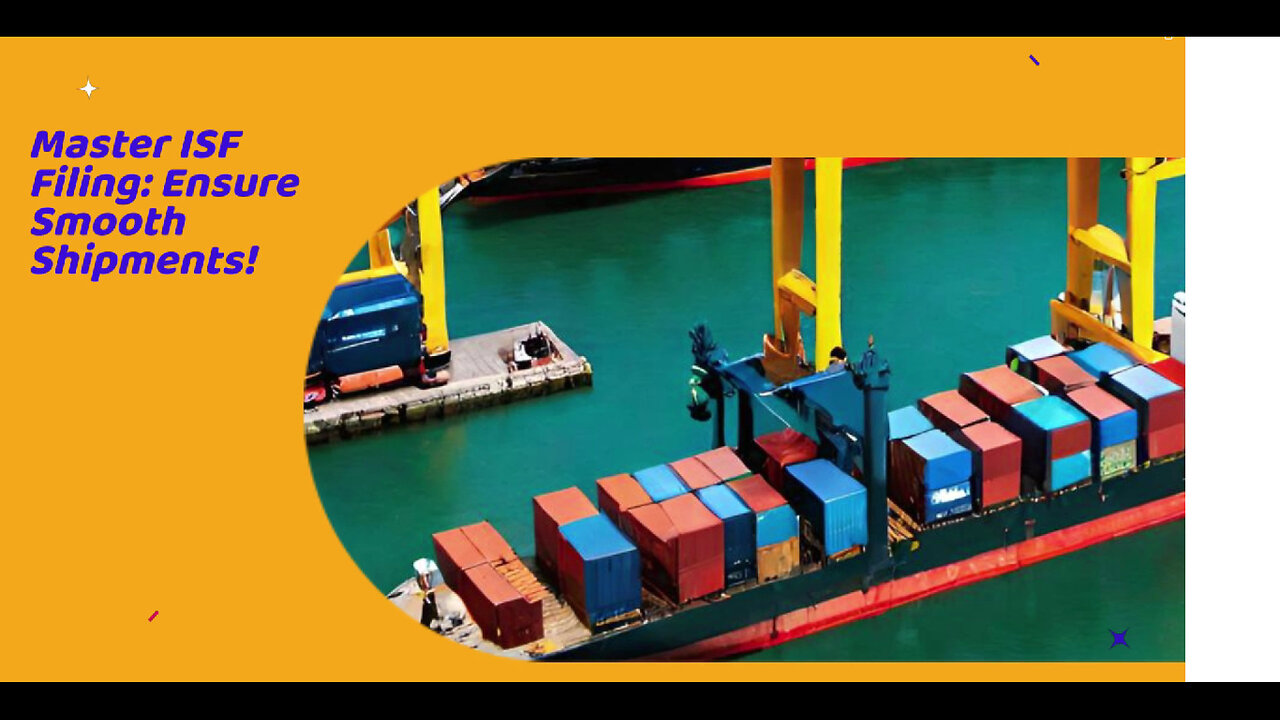Premium Only Content

Mastering the ISF Filing Process: Ensuring Smooth Shipment Handling
ISF Solution | (832-904-9333)
[email protected] | www.isfsolution.com
In today's episode of High Stakes Logistics, we explored the important process of ISF filing in customs brokerage. ISF stands for Importer Security Filing and is a mandatory requirement for all shipments being imported into the United States. The purpose of ISF filing is to enhance national security and streamline the customs clearance process. Importers are required to submit an ISF filing at least 24 hours prior to the cargo being loaded onto a vessel. This filing includes essential information such as the shipper's name, consignee's name, and commodity details. Failure to comply with ISF filing requirements can lead to penalties, cargo holds, and delays in cargo clearance. Customs brokers play a significant role in the ISF filing process by ensuring that all necessary information is correctly provided and by leveraging their extensive knowledge of customs regulations. Additionally, customs bonds serve as a financial guarantee to ensure the payment of customs duties, taxes, and penalties in case of any non-compliance or violations. Overall, timely and accurate ISF filing is crucial for a smooth and successful import operation.
#usimportbond #isfcustomsbroker #uscustomsclearing #isfentry
Video Disclaimer Here: For educational purposes - No affiliation with US government sectors.
0:18 - ISF stands for Importer Security Filing, a mandatory requirement for all shipments imported into the United States, enhancing national security and streamlining customs clearance.
0:38 - ISF filing includes important information like shipper's name, consignee's name, and commodity details, submitted at least 24 hours before loading onto a vessel.
0:59 - There are two types of ISF filings: Importer's ISF filed by the importer or their agent, and Carrier's ISF filed by the ocean carrier or their agent.
-
 2:15:52
2:15:52
Steven Crowder
5 hours agoWho is the Real Myron Gaines | Ash Wednesday
235K221 -
 LIVE
LIVE
Sean Unpaved
1 hour agoRankings, Recaps, & Deadline Deals: CFB Shake-Ups & NFL Trades
877 watching -
 LIVE
LIVE
Barry Cunningham
2 hours agoBREAKING NEWS: PRESIDENT TRUMP SPEECH AT THE MIAMI BUSINESS FORUM! (MIKE JOHNSON PRESSER)
1,839 watching -
 LIVE
LIVE
Side Scrollers Podcast
2 hours agoAsmongold SUED for Emotional Distress + Hasan REJECTED+ INSANE Plane Crash + More | Side Scrollers
719 watching -
 1:00:32
1:00:32
VINCE
5 hours agoNYC Has Been Seized By The Communists | Episode 162 - 11/05/25
202K302 -
 1:47:26
1:47:26
LadyDesireeMusic
2 hours agoLive Piano & Convo Rumble Rants/ Subs to Request
7.96K2 -
 LIVE
LIVE
SOLTEKGG
4 hours agoGOING FOR KILL RECORD - BF6 SKIN Giveaway
64 watching -
 1:04:48
1:04:48
The Rubin Report
3 hours agoCharlie Kirk’s Warning for MAGA if Mamdani Won
36.7K130 -
 1:33:32
1:33:32
Graham Allen
5 hours agoTold You The War Was FAR From Over… The Blue Wave Just Proved It! Evil Is Fighting Back!
121K107 -
 2:54:17
2:54:17
Badlands Media
11 hours agoBadlands Daily: November 5, 2025 – Election Illusions, Filibuster Fallout & The Deep State’s Next Move
109K11